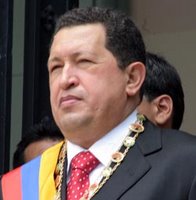 Hero worship is always a risky undertaking. More than one hero has been discovered to have very human shortcomings. The real shortcomings, though, are not with the hero but with the worshiper. This is especially true for people who should know better.
Hero worship is always a risky undertaking. More than one hero has been discovered to have very human shortcomings. The real shortcomings, though, are not with the hero but with the worshiper. This is especially true for people who should know better.Hugo Chavez, the career military officer who attempted a coup in 1992 against the Venezuelan government and was elected president of Venezuela in 1998, has become something of a hero to some on the left. His constant harangues against the United States are one source of this admiration but so is appeal to the poor of Venezuela seeing him as possibly a latter-day Juan Peron.
However, Ian Buruma writing in the Sunday London Times, points out that the left’s tradition of promoting liberty is lost when singing praises to those like Chavez who has an authoritarian streak. He says,
That Chavez is applauded by many people, especially the poor, is not necessarily a sign of democracy; many revolutionary leaders are popular, at least in the beginning of their rule, before their promises have ended in misery and bloodshed.
The left has a proud tradition of defending political freedoms, at home and abroad. But this tradition is in danger of being lost when western intellectuals indulge in power worship. Applause for autocrats undermines the morale of people who insist on fighting for their freedoms Leftists were largely sympathetic, and rightly so, to critics of Berlusconi and Thaksin, even though neither was a dictator. Both did, of course, support American foreign policy. But when democracy is endangered, the left should be equally hard on rulers who oppose the US. Failure to do so encourages authoritarianism everywhere, including in the West itself, where the frivolous behaviour of a dogmatic left has already allowed neoconservatives to steal all the best lines.
You may read his entire essay here.
And the Slaves of Academe sees Chavez as just the flip side of George Bush as she pleads for no more heros:
Hugo Chavez is considered in the West a leftist (except, ironically, by the Venezuelan left, which considers Chavez as having displaced a true left in the country), and rhetorically he fits the bill, but in practice he and George W. Bush have quite a lot in common, in terms of methodology. Both have moved aggressively to control the state and harness it to their personal politics. Both have assumed mythic proportions (in their own minds, at the very least) as saviours of the nation, have politicised and compromised civil society, both preside over deeply split electorates, and are controversial and divisive leaders who relish conflict and the grand gesture.
You may read her entire piece here.
No comments:
Post a Comment